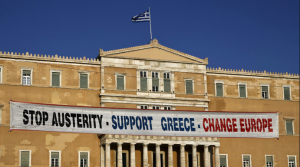 By Michael Nevradakis
By Michael Nevradakis
Originally published in 99getsmart.com
It was just four months ago, though it already seems like a lifetime away, when Greece’s celebrity finance minister Yanis Varoufakis publicly stated that “creative ambiguity” won the country a “loan lifeline” from the institutions formerly known as the troika: the European Central Bank, the European Commission, and the International Monetary Fund. Despite the never-ending soap opera that is Greek crisis politics though, few would have imagined that the SYRIZA-led coalition government would succeed in outdoing itself in terms of its “creative ambiguity,” by calling a referendum which, just days before the polls open, remains remarkably unclear as to its actual meaning and potential consequences.
Setting The Stage for the Referendum
What has been actually happening in Greece though, over the past week? Lots has been heard in the Greek and international media, much of it tainted by either a pro-austerity or pro-SYRIZA bias and a generous dose of sensationalism. Cutting through all of this media-created noise, the realities are as follows: in a peculiarly-timed nationally-televised address which aired live a minute after midnight on June 27, Greek prime minister Alexis Tsipras announced to the nation that a referendum would be held on whether or not to approve the set of proposals put forth by the “institutions.” The last referendum held in Greece was in 1974, just after Greece’s Western-backed military regime fell, when Greeks overwhelmingly voted “no” for the restoration of the monarchy. This announcement was initially hailed by a majority of the public, as it was seen as a bold step towards giving the Greek people a direct say in the country’s affairs for the first time during the five-plus years of financial crisis.